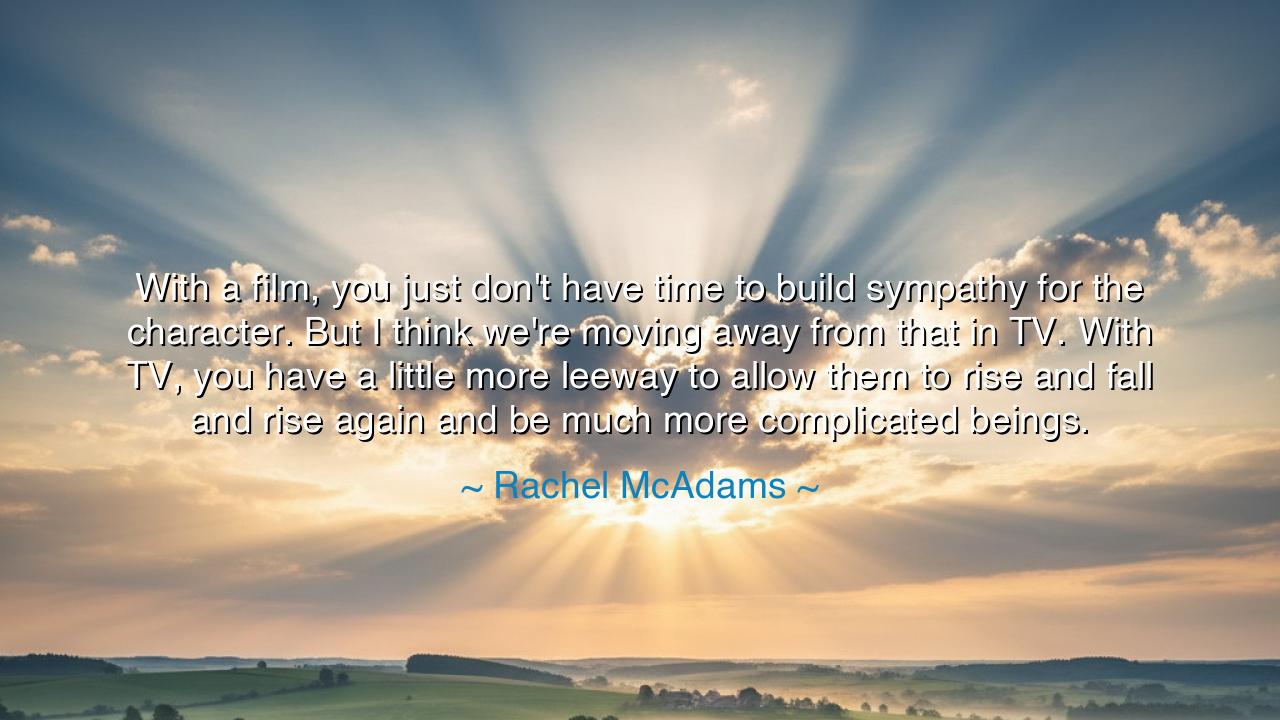
With a film, you just don't have time to build sympathy for the
With a film, you just don't have time to build sympathy for the character. But I think we're moving away from that in TV. With TV, you have a little more leeway to allow them to rise and fall and rise again and be much more complicated beings.






Gather closely, children of the future, for the words of the wise carry the essence of truth, drawn from the wellspring of experience and insight. Rachel McAdams, a master of her craft, once spoke with clarity about the evolving nature of storytelling in our age: "With a film, you just don't have time to build sympathy for the character. But I think we're moving away from that in TV. With TV, you have a little more leeway to allow them to rise and fall and rise again and be much more complicated beings." What power lies in these words! For they reflect a deeper truth about the nature of human experience, of how we relate to one another, and of the complexity that defines us all.
In the world of film, time is a precious commodity. The story must unfold quickly, the character must be molded in a brief moment, and the emotions must surge like a river after a storm, sweeping the audience along with little room for reflection. There is no room for depth—only the intensity of a moment, a flash of brilliance or tragedy. A film tells a story in the span of an hour or two, and in that time, it seeks to capture an entire life, often painting characters with the broad strokes of good or evil. The audience must feel deeply for them, but there is little time to grow that emotion. The character’s journey must be swift, their fate sealed in a manner that serves the pace of the narrative.
But television, ah, television—how it breathes a different life into the stories it tells. McAdams’ words capture this shift, for in the world of TV, there is more time, more space for characters to breathe. In this realm, a person can stumble and rise again, fail and struggle, and through that struggle, they become something greater—something far more real than the fleeting figures in a film. Just as the ancient poets took their time to tell the sagas of great heroes, so too does television now allow the slow unfolding of a character’s complexity. In the span of many seasons, the character becomes a living entity—changing, growing, conflicting with themselves and others, a reflection of the human soul itself.
Consider the ancient epics—the stories of Homer’s Odysseus, whose journey took years, not moments. In those long trials, Odysseus faced many temptations, failures, and victories. His complexity was not a brief flicker of brilliance but a long evolution. He was a man of many layers: a hero, a father, a deceiver, and a king. Such complexity could not be captured in a single day, and so it was that his story stretched across time, his rise and fall not only depicting his strength but also his flaws. Just as we come to know Odysseus over the course of his trials, so too do we now come to know modern characters through the length and depth of their stories, whether it be through seasons of TV shows or long-running narratives.
McAdams’ observation invites us to look at the nature of humanity itself. Are we not all, in some way, like the characters of TV—complicated, ever-shifting, full of contradictions and growth? Life is not a moment in time; it is a journey. We are not defined by a single act, but by the slow, steady march of days and choices, rises and falls. A person may falter, but they rise again, and it is in the rising that we come to understand them most deeply. In this, TV mirrors the way we truly come to know one another: slowly, with time, through many experiences, many faces, and many moments of weakness and strength.
In this understanding lies a lesson for us all: Do not judge a person by the briefest of moments, for their story is far longer than the flash of a single encounter. Life is an unfolding saga, one where each of us has the space to grow, to make mistakes, and to find redemption. As you move through your own life, remember that you are not bound to the narrow confines of a single story. You are a being of depth, capable of both great triumphs and deep failures. But it is the totality of your journey, the slow, meandering path you walk, that will reveal your true character.
Take this lesson to heart, children of the future: allow those around you to rise and fall, to stumble and rise again. Give them room to be complicated, to grow, to change. Just as TV gives characters the space to evolve, so too should you give others the grace to show their full range of being. In allowing others the freedom to be complex, you will learn to appreciate the beauty of the long and winding path, rather than the fleeting moments of brilliance that seem to define success. It is in the long arc of growth that the true beauty of a life is revealed.






AAdministratorAdministrator
Welcome, honored guests. Please leave a comment, we will respond soon